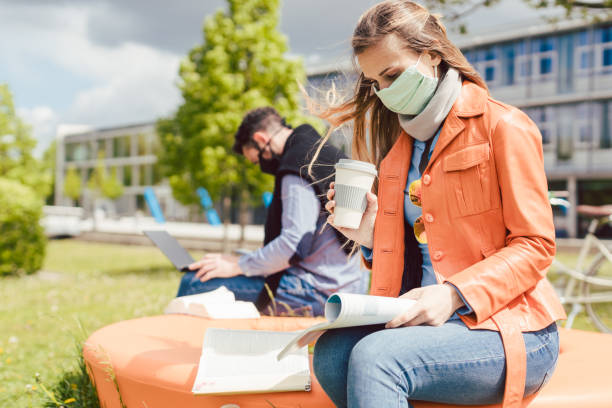By Gwendolyn Nowaczyk
During this past year with the pandemic, I helped lead an independent research study about the impact that COVID-19 has had on Flagler College students’ health, specifically juniors and seniors.
We decided to do this study because the pandemic is something that we have not seen before as college students and our school year was drastically changed in such a short amount of time that we were curious about how others felt. We also wanted our peers opinions on how the situation was handled by the college and how it had impacted them individually.
Our research was tailored to look specifically at physical health, which we defined with three areas that included sleep, appetite and physical health. With this we were trying to see if the pandemic had caused their sleeping, eating and exercising habits to change after returning to Flagler College. Additionally, we wanted to see whether the use of a school-mandated mobile health app helped with the feeling of uncertainty about returning to campus.
It was quite an experience both planning and executing the research. I never really had thought about the effort, steps and time that went into such projects. Due to the fact our study dealt with people we had to become certified and trained in Ethical Research through the Institutional Review Board (IRB) of Flagler College, which was also an integral step in receiving grant funding from the school.
Fast forward to issues with documentation, approving our study and receiving the grant we were finally able to implement and start our research. We used a mixed method approach, including a 59-item survey and 8 focus groups, dividing evenly between juniors and seniors. This was used so that we could identify themes and then look more in-depth at what was reported through discussions using both quantitative and qualitative data.
Throughout the process of recruiting participants, it was quite a journey because we had to visit classrooms, host tabling events and send mass emails. Again, our pool consisted of Flagler College juniors and seniors, and it did not matter whether they lived off or on-campus, although that was analyzed when looking at the data.
It surprised me how willing people were to take the survey and the feedback that was given. But we managed to gather almost 200 people to take our survey which we viewed as victory given the circumstances of COVID-19 and the decreased presence of students on-campus.
Next, we conducted focus groups to gather data about specifics regarding student health. We held these over Zoom which was both easier than in person because we could be anywhere at anytime; but, it was also harder because people would forget or would have bad service and would continually lose signal. With these meetings we gained amazing data and stories about the usage and unreliability of the app. A common theme of being that students can easily lie on the app and put others at risk because they are unwilling to admit that they are experiencing COVID-19 symptoms.
Regarding the other areas, the data that stood out the most was that physical activity moved in a sort of wave. People reported in the beginning that their exercise significantly decreased in the Fall 2020 semester but by the spring semester, the activity was back to prior COVID-19. There was also the mention that with fall, although they had more time because of online classes, they did not take that time to exercise, whereas with the spring semester, they are more adept at planning and do not feel as fatigued. Leading to a key factor mentioned about physical health and activity, that participants have noticed an surge in back and neck pain, as well as tiredness from looking at the screen all day because of Zoom classes.
Sleep was not seen as being greatly impacted. There were still changes and disturbances to sleeping schedules and quality of sleep but people shared that they were receiving more, it just was not as restful. It was also found that the main factor that was effecting their sleep was stress, followed by COVID-19.
Finally with appetite, due to online classes people have both been snacking more while others have been cooking healthier food because they are at home and have more opportunities to cook for themselves. There was a range, as seen with the earlier data, that online classes can both help and hinder as noticed with the increase of healthy eating for some due to more time, or the increase in snacking because the amount of time now spending in front of a computer because of classes. However, there was few who said that COVID-19 changed how hungry they felt, or whether they had an increased or decreased appetite, there was mainly the change in eating habits.
Although there is quite a bit more data that can be explained, those were the highlights that stood out to my research group as well as to myself.
With this experience and journey I have gained insight that would be very helpful for prospective graduate students. I believe that independent studies and research should be advertised more on-campus because before, I had no clue that it was a possibility, much less how one went about doing it.
My biggest takeaway from this research project was of course the results and the seeing the impact that the pandemic has had upon students. But it was also that there are numerous opportunities to be involved on-campus that you never would have thought of before. I never considered doing a year-long research project and yet I was Co-Principal Investigator and led a team of four.
This research going forward, will hopefully help the school in handling any future occurrences and allow them an opportunity to listen to their students and to help them have the best experience they can and take care of their health.



Be the first to comment on "COVID-19 and Physical Health of Flagler Students"